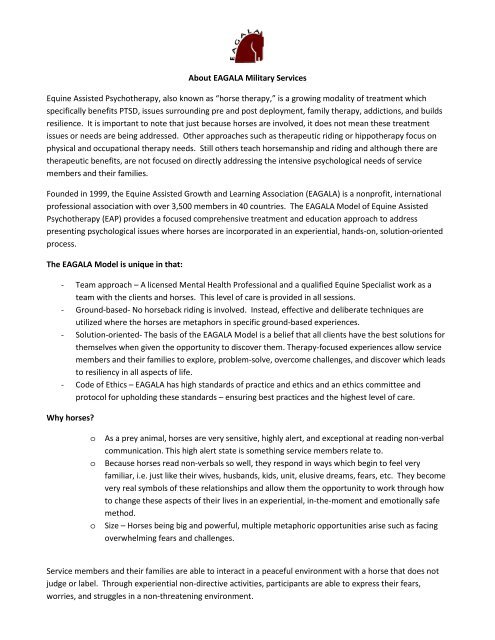Retired Racehorses
tfrr_reportandappendicesfinal
tfrr_reportandappendicesfinal
- No tags were found...
You also want an ePaper? Increase the reach of your titles
YUMPU automatically turns print PDFs into web optimized ePapers that Google loves.
About EAGALA Military Services<br />
Equine Assisted Psychotherapy, also known as “horse therapy,” is a growing modality of treatment which<br />
specifically benefits PTSD, issues surrounding pre and post deployment, family therapy, addictions, and builds<br />
resilience. It is important to note that just because horses are involved, it does not mean these treatment<br />
issues or needs are being addressed. Other approaches such as therapeutic riding or hippotherapy focus on<br />
physical and occupational therapy needs. Still others teach horsemanship and riding and although there are<br />
therapeutic benefits, are not focused on directly addressing the intensive psychological needs of service<br />
members and their families.<br />
Founded in 1999, the Equine Assisted Growth and Learning Association (EAGALA) is a nonprofit, international<br />
professional association with over 3,500 members in 40 countries. The EAGALA Model of Equine Assisted<br />
Psychotherapy (EAP) provides a focused comprehensive treatment and education approach to address<br />
presenting psychological issues where horses are incorporated in an experiential, hands-on, solution-oriented<br />
process.<br />
The EAGALA Model is unique in that:<br />
- Team approach – A licensed Mental Health Professional and a qualified Equine Specialist work as a<br />
team with the clients and horses. This level of care is provided in all sessions.<br />
- Ground-based- No horseback riding is involved. Instead, effective and deliberate techniques are<br />
utilized where the horses are metaphors in specific ground-based experiences.<br />
- Solution-oriented- The basis of the EAGALA Model is a belief that all clients have the best solutions for<br />
themselves when given the opportunity to discover them. Therapy-focused experiences allow service<br />
members and their families to explore, problem-solve, overcome challenges, and discover which leads<br />
to resiliency in all aspects of life.<br />
- Code of Ethics – EAGALA has high standards of practice and ethics and an ethics committee and<br />
protocol for upholding these standards – ensuring best practices and the highest level of care.<br />
Why horses?<br />
o<br />
o<br />
o<br />
As a prey animal, horses are very sensitive, highly alert, and exceptional at reading non-verbal<br />
communication. This high alert state is something service members relate to.<br />
Because horses read non-verbals so well, they respond in ways which begin to feel very<br />
familiar, i.e. just like their wives, husbands, kids, unit, elusive dreams, fears, etc. They become<br />
very real symbols of these relationships and allow them the opportunity to work through how<br />
to change these aspects of their lives in an experiential, in-the-moment and emotionally safe<br />
method.<br />
Size – Horses being big and powerful, multiple metaphoric opportunities arise such as facing<br />
overwhelming fears and challenges.<br />
Service members and their families are able to interact in a peaceful environment with a horse that does not<br />
judge or label. Through experiential non-directive activities, participants are able to express their fears,<br />
worries, and struggles in a non-threatening environment.


